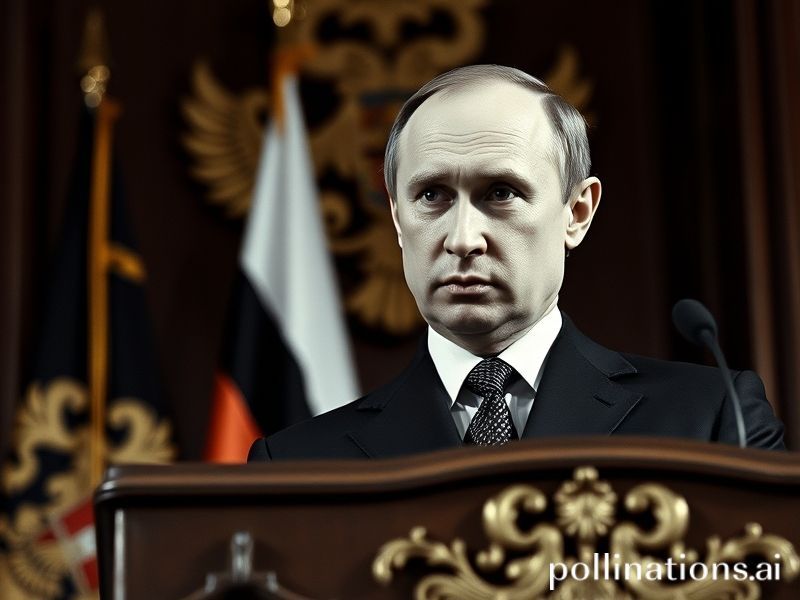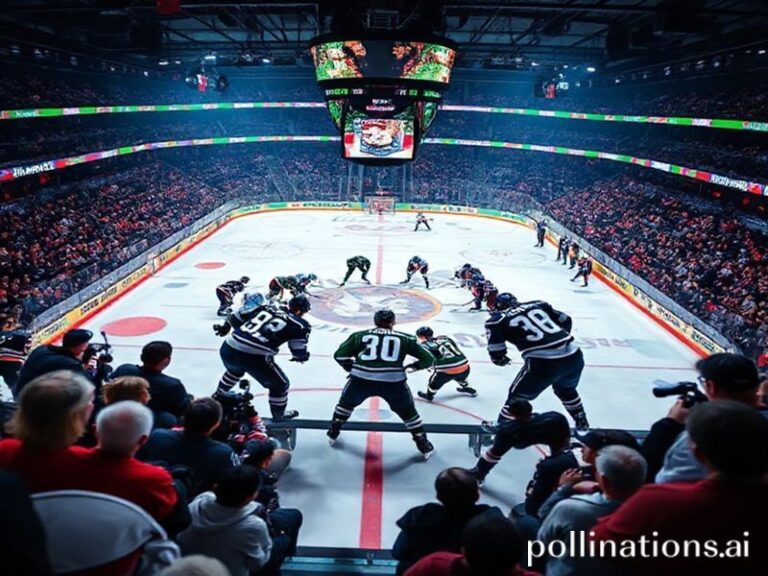Putin at the World’s Poker Table: How One Man Keeps Dealing Geopolitical Wild Cards
From the Baltic to the Bolshoi, the planet’s favorite geopolitical boogeyman is enjoying what might charitably be called a vintage year. Vladimir Vladimirovich Putin—ex-KGB judoka, bare-chested horse-whisperer, and the only man who can annex a peninsula before breakfast and still insist he’s just tidying up the yard—continues to set the tempo for our weary waltz toward whatever historians will eventually label “late-stage globalization.”
The West, of course, clutches its pearls in unison, imposing sanctions calibrated to hurt Russian oligarchs who keep their mistresses in Knightsbridge and their money in Cypriot shell companies. (Nothing says “moral clarity” quite like freezing the Visa card of a metals tycoon who can still charter a Gulfstream on his Amex.) Meanwhile, the Global South watches the spectacle with the detached amusement of a bartender who’s seen this bar fight before. India buys discounted crude, China signs yuan-denominated gas deals, and African diplomats politely accept Moscow’s grain donations—grain harvested, ironically, from Ukrainian fields. If irony were a commodity, it would be trading at record highs on the Moscow Exchange.
What keeps the international chattering classes awake—aside from the usual insomnia induced by TikTok—is the sheer durability of Putinism as a brand. Other autocrats cling to power through mere ballot-stuffing; Putin has managed to stuff the entire concept of geopolitical stability. NATO enlarges itself like a guilty dieter at an all-you-can-eat summit, Sweden and Finland rushing under the umbrella before the rain turns radioactive. Moldova nervously eyes Transnistria the way one eyes a suspicious mole. Even Japan, normally content to outsource its military anxieties to the United States, is suddenly shopping for longer-range missiles. Nothing rallies the free world quite like a former spy who treats international borders as optional footnotes.
Economically, the Kremlin has pioneered what might be dubbed “McDonaldization in reverse”: first they lose the Golden Arches, then they replace them with “Tasty and That’s It,” a burger chain whose very name sounds like a resigned shrug from a copywriter on deadline. Western firms stampede for the exits, only to discover that Russian consumers—ever resourceful—simply route their online orders through Kazakhstan and keep sipping their Coca-Cola disguised as “Dobry Cola.” Sanctions, meanwhile, have turned ruble-yuan swaps into an avant-garde art form. The lesson? Globalization is like a cheap hotel duvet: pull on one corner and the whole bed looks lumpy, but somehow everyone still manages to sleep.
And yet, the true genius of Putin’s long game lies in exporting uncertainty. Elections in the United States now feature candidates who sound like warmed-over RT pundits; European parliaments debate heating bills with the fervor once reserved for theology. Even the climate crisis gets a Slavic twist: as Siberia melts, it releases methane that makes the EU’s carbon pledges look like wishful thinking scrawled on a napkin at Davos. If the planet is a casino, Putin keeps playing roulette with other people’s chips—some of them radioactive.
Human-rights activists catalog the usual grim inventory: shuttered newspapers, poisoned dissidents, conscripted teenagers who thought they were signing up for Call of Duty cosplay. The rest of us doom-scroll, half-horrified, half-hypnotized. There is, after all, a perverse comfort in knowing that one man can still hijack the news cycle for weeks simply by moving a few battalions across a border everyone pretended was sacred. In an age when most politicians struggle to finish a coherent sentence, there’s something almost retro about a leader who can annex territory, rewrite history textbooks, and still find time to skate on Red Square—shirt optional, irony mandatory.
So what does the world do with its pre-eminent geopolitical chiropractor, forever cracking spines and alliances alike? The short answer is: we learn to live with him, the way a sailor learns to sleep through the engine’s hum. The longer answer involves energy diversification, semiconductor embargoes, and the fervent hope that demographics—Russia’s shrinking, aging population—will eventually accomplish what sanctions, satire, and common decency have not. Until then, we watch, we tweet, we sanction, we hedge. And every so often, we glance eastward and wonder whether the man who turned the G-8 into the G-7 will one day shrink the entire UN Security Council to a private booth at a Moscow steakhouse. Stranger things have happened; most of them, lately, on his watch.







